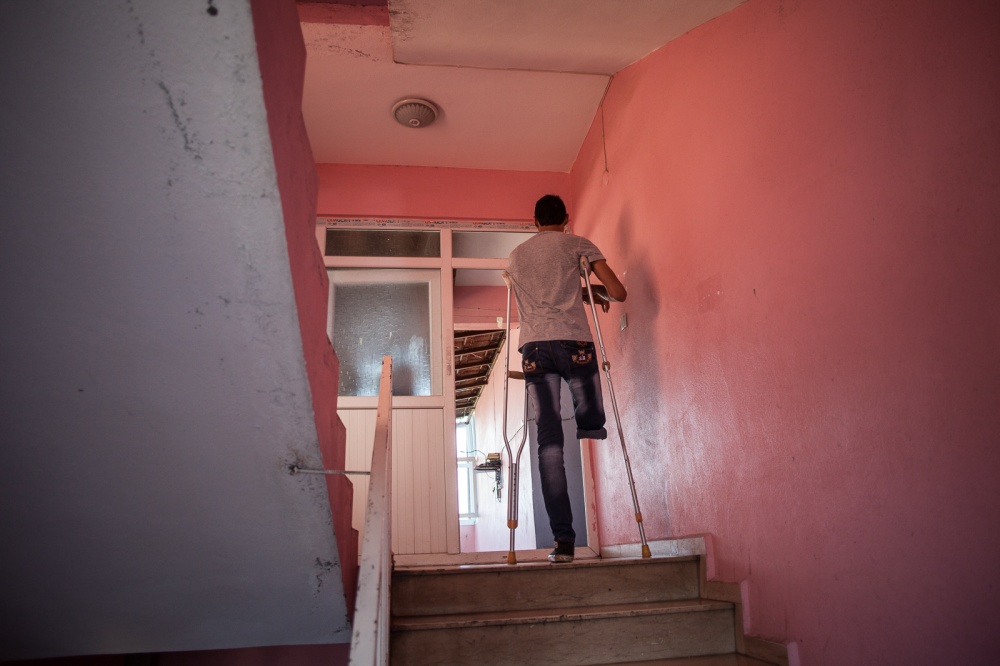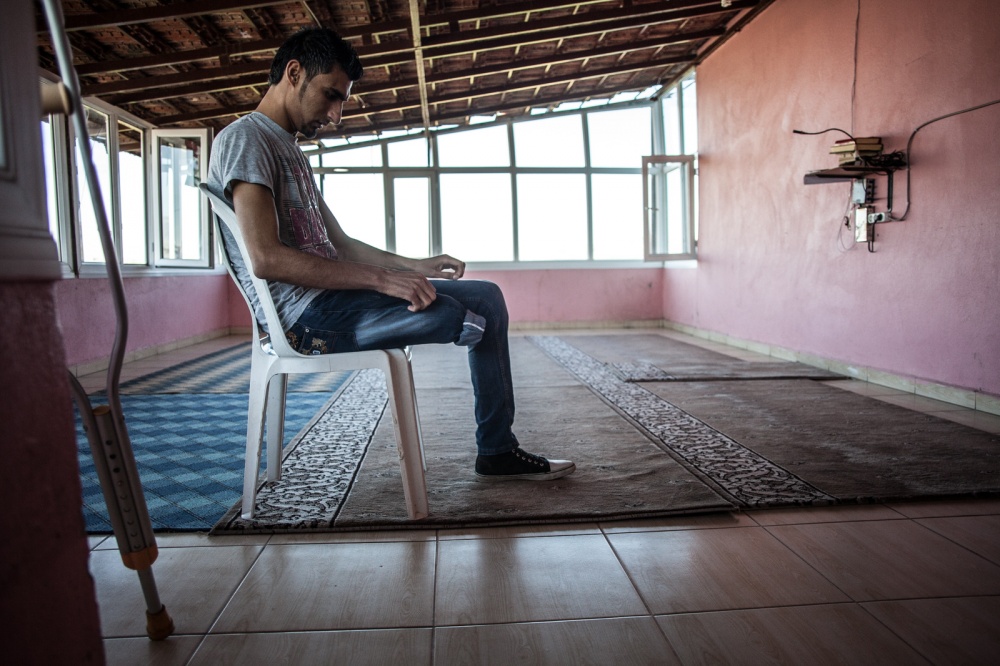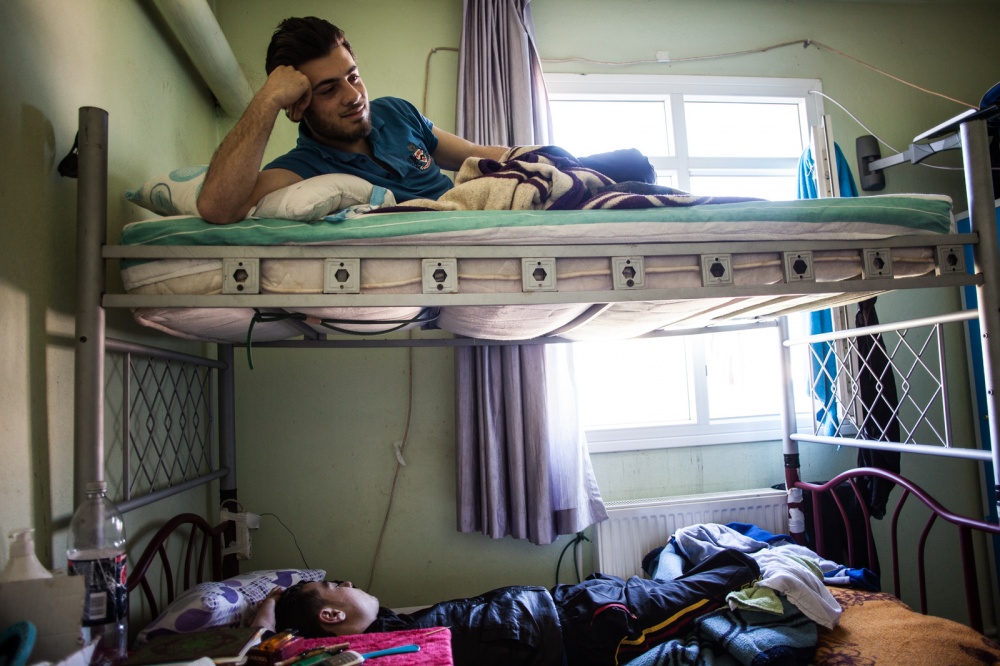Brothers. Fighters in the Free Syrian Army and wounded in battle. This is the story of the strong family ties that help the face the new battle of recovering from their severe injuries.
Text: Rafal Grzenia, Photographs: Maciej Moskwa
Reyhanli
Down at the Anatolya Cafe no one speaks Turkish. The loud arabesque coming from the speakers drowns all conversations anyway. The waiter puts a cup of smuggled Ceylon tea on a newspaper full of anti-Bashar cartoons and returns to a board he has been covering with pinned-up drawings made by children from the Syrian kindergarten.
Before the Syrian war this Turkish border town had a population of sixty thousand. Although a majority of its residents were of Arab origin, their only connection with Syria was business, legal or otherwise, done at the large border crossing nearby. Since mid- 2011, when the violent crack-down on the Arab Spring gained pace in Syria, Reyhanli received over seventy thousand refugees.
Nowadays every shawerma, cafe or store outside the city centre has a Syrian clerk. Workers from the East fill construction sites, drive buses or even cook at restaurants for half the usual wage. On every corner hundreds of kids sell cigarettes and tissues or simply beg in broken Turkish.
Turkish women, with their flowery velvet scarfs, or men in ironed white shirts, make a rare sight in the streets, replaced by figures in grey jallabiyah or nikab.
One thing sets Reyhanli apart from other towns along the Turkish border, where millions of Syrians sought refuge over the last years. It lies on the corridor connecting Turkey with the territory liberated by the rebels. Neighbouring Antakya housed the first staff meetings of the Free Army, stationed for much of the war in the Atmeh camp just across the border. Reyhanli itself serves as a rebel resort, where exhausted fighters go to rest, but more importantly it has the first decent hospital north of the border, receiving wounded Free Army fighters. Among the crowds filling the streets one can easily spot rebel veterans, groups of men in their early thirties, burly - sporting obligatory leather jackets, clean shaved moustaches and long beards. Battledress and heavy boots hardly conceal a slight limp, a cramped arm, movements and expressions marked by wounds and fatigue. In twos or threes, they take long walks in complete silence.
The clinic
Doctor Yahya Rahhal, 37, a former medic of the government army, abandoned his unit when the revolution started. He spent the first months working in field clinics of the Free Army, finally to arrive in Turkey with his family. He is just one of 15 thousand doctors to leave Syria over the three-year long rebellion - fleeing mass arrests by security forces in the first part of the revolution and seeking any type of employment in the second, with 57 per cent of hospitals in the country in ruins, levelled in offensives of all the armies.
His post-op and rehabilitation centre is just one in a chain of medical centres established in Turkey by the Syrians. While Turkish hospitals do admit the refugees, they are severely overwhelmed and only provide emergency services. Consequently, there are now three semi-official Syrian clinics in Reyhanli alone.
The clinic has been operating since June 2012 in a closed-down student hostel rented from the Antakya University. "We are financed by French and Syrian NGOs and private donors. We receive no support from the Turkish government or, and let me emphasize that, from the Syrian National Council [the rebel government formed in exile]. As for today, we have enough to keep the place running till 10 August, and after that - I don't know what will become of us". Five doctors, seven nurses, five physiotherapists - all of them Syrians - provide care to amputees, patients with severe injuries and brain damage.
The clinic admits sixty patients, each with a companion, usually a family member. Some leave after two or three months, but typically treatment takes longer, from six months to a year. Thus the clinic adopted an unusual form, a cross between a hostel and a sanatorium. "We all know one-another, we're all on first-name terms and we try to make a home here for all of those people".
Giving us a tour of the clinic dr. Yahya explains: "We treat everyone, victims from both sides of the conflict, fighters and civilians of all religions." Indeed, most rooms are occupied by civilian victims of air-raids, many of them women and children.
Another group...
...are the Free Army men.
The Free Army men
The time to make closer contact is in the evening, in front of the clinic. They are coming back from a walk by the lake, forming a long, thin line. A man with one leg, on crutches. Behind him another, both legs amputated, in a wheelchair. First a quick test: "Do you know how the civil war started? Do you know it was a revolution and peaceful protests? Do you? Does anyone even remember in Europe"?. They tell me their names.
A byname, or here a nom-de-guerre, is a long tradition in Syria. Al-Homsi comes from Homs, ibn Mustafa is the son of Mustafa, abu Ahmad fathers Ahmad. During the revolution, bynames like these became a necessity in clandestine operations. It helped mislead the security services working against the protesters and activists. Later, when the war started, false names protected the true identity of the fighters and kept their families safe from retribution and torture. Over time it grew to become a popular revolutionary fashion.
This here is abu Djud, with abu Hassan, abu Ahmad, and abu Islam, although not one of them has a son. Barely in their twenties, laughing and joking, dressed in track suits, they all look like students. "We are the Free Army".
Jesh al-Hur
The name "Jesh al-Hur" [the Free Army] is repeated like a mantra, although it too has become a byname. Established in July 2011, the Free Army was for the first year and a half the most powerful military rebel organisation, uniting thousands of small groups in a fight against the Assad regime. The call to fight for a new, secular, democratic state, raised by deserters from the regime Syrian army, was joined by a great number of volunteers. The Army received support from the Gulf as well as many western states - Turkey, Europe and the US, and for a long time it remained the only military power associated with the revolution.
As the strength of local and foreign-backed islamist groups increased, however, the Free Army began to lose its coherence and was transformed into a more disparate coalition. A decline in its popularity with the European and American officials as well as Syrians themselves soon followed, due to dissatisfaction with the inefficiency of its activities and the anarchy in liberated areas.
Towards the end of 2013 a military organisation known as the Islamic Front separated from the Free Army. A majority of islamist groups were now united under the call for an Islamic state. With new sponsoring opportunities and aggressive operations on the ground the new player soon took over, and is now the largest rebel formation. "There is no Free Army now" - claims Khaldoun B., a Syrian activist - "even the non-islamic and lay groups take on a radical islamic costume to receive funds from the Gulf and avoid a confrontation with the Front."
The disappearing army left behind an empty name, used both for the moderate rebel circles and islamist groups of Syrian recruits, or even al-Nusra - an al-Queda linked group, famous for massacres of non-Sunni civilians and attracting from around the world a collection of jihadi fighters largely indifferent to the fate of the country.
The student
Abu Djud took three years of archaeology in Aleppo, a city of two million residents, before he got dismissed from the university for participating in the first revolutionary rallies. Once armed rebellion erupted in the city in the summer of 2012, him and his two brothers joined the same katibah (unit) of the Free Army. "Was it hard to run from student to soldier? Sure it was. But you don't think of it this way. We're not doing this for ourselves, but for our children. We have students, doctoral candidates, lawyers, peasants - you will find someone from every social group. Of course, many come and then leave, not everyone is made for this. They fight for a week or two and return home or join the auxiliaries. They work at hospitals, sit at lookouts, they carry messages. I stayed."
Eight months ago his brothers carried him away when shrapnel from an explosive rocket tore open his right leg. "We were 700m from a Syrian army position. I was firing when I saw the shell come down. It exploded some fifteen metres from me. I stayed conscious, I didn't feel any pain, although shrapnel tore some muscles."
From the field hospital he was sent across the border, to Kilis. He waited for three days on the stretcher in a hallway of a Turkish hospital, asking for help. The Turkish doctors could not understand him, the interpreters were always very busy. "They didn't even give me anything for the pain". His brother took him back to Syria, to a hospital in Bab al Hawa, right on the border. There, after unsuccessful attempts to treat his leg, it was finally amputated. "I try not to think about it anymore. Perhaps in the beginning they could have saved it. Now it doesn't matter".
He arrived here, at the Reyhanli clinic, over two months ago. He is now waiting for the stump to heal, while also fighting a liver infection. Later - he plans to buy a sports-grade prosthetic leg - anywhere but Turkey, where the prices are sky-high. He is no use to the Free Army anymore. Maybe he can bring his fiancée across the border and take her to Lebanon, to look for some work. They're thinking of kids, two, maybe three.
The Mother of All Battles
They're not there for the Friday prayers at the mosque, but in the afternoon we meet for a walk. Abu Djud and his brother, abu Chalid pose for photographs under a waterfall on a stream coming down from the surrounding hills. Fifty meters up the slope is cut with lines of barbed wire. The spring is in Syria.
The waterfall feeds a small lake, where the Syrians go to hang out, including many of the recovering patients from the clinics in the area. Bearded young men share a water pipe. A man on a wheelchair is surrounded by a group listening to his front-line stories. Three little boys take turns to jump into the lake. "Where are you from, boys?". "I'm from Aleppo, he's from Idlib, and that one is all the way from Deir az Zor".
Abu Chalid, 29, is a taylor. He used to run a shop in Aleppo while also making some extra money as a tourist guide. He is the only one in the group with a wife and a 9-months-old baby boy. He likes women, he likes to lough and he can spend hours over his nargila. Slightly chubby, slow, jovial, the most unlikely man to fight a war.
"Down on the front-line you live in a sort of ecstasy. We eat together, we pray together before the battle, we launch the attack together. We share jokes about the dumb mukhabarat agents [Syrian secret service]. We're always together with the shebab [the guys]. Together even with those, who fight for the regime. The distance from the enemy is often no more than the thickness of a wall or the breadth of a street. Then we poke fun at one another. They ask if we have washed our beards, we ask them if they washed their long necks [a characteristic feature of president Assad]."
Neither he nor abu Djud are likely to return to Aleppo. The battle for the city - called the Mother of All Battles - raging for twenty one months now, has reduced the city to a dessert. Around seventy per cent of the inhabitants are estimated to have left Aleppo since December last year, when the barrel-bomb air-raids intensified. "It is not possible to live there, only to fight." And they no longer feel like fighting.
Vet
They both appreciate a Kalashnikov. "Within a week you will shoot it as good as anyone." One door down it's two brothers again. Obeida - his favourite is the soviet PKM on a tripod. Short, burly, muscular, he is 29 years old, but haven't earned a nom de guerre yet. He is quick to lough, open, bursting with energy. But he will no tell you much or allow a photo. The pictures in his cell show a man in a black jallabiyah, his hair covered by a headscarf, with his index finger pointing up. There is no god but Allah.
His cousin, Hassan, 23, smokes weak, yellow gauloises, giving rise to endless jokes at the clinic. He is not bothered, though, since everyone here knows full well he is the real fighter. He mans the heavy DshK machine gun mounted on a pick-up truck. It is his third GSW, this time from a sniper, just below the knee. "Only the commander in our unit was wounded more than me - five times". He's going back to the frontlines as soon as he's able. He loves the fight.
Together with Obeida he serves with the Islamic Front, but they both keep saying: "The revolution is all of us, the divisions in the Free Army are artificial". They are the type of young fighters, who listen to sheikh Omar Bakri speaking about paradise and watch films from the battles on their cell phones, with Quran quotes in the background. They take criticism of islamic units badly. Even when asked about the most radical group in the war, opposed by the Free Army, the Islamic Front and even al-Nusra, they still try to defend it. "The Islamic State of Iraq and Levant (ISIS) was fine in the beginning, until they accepted too many foreigners and regime agents. This ruined them. They turned away from faith."
Nusra
He sits alone in the courtyard of the clinic, resting his crushed leg in the sun. Dressed in black, with a black cap and a black beard. Abu Chalid is 25 and he fights in Jabhat al Nusra, a military organisation openly admitting ties with al Queda and listed by the US as a terrorist organisation.
He joined the rebel army late, only a year ago. He used to sell vegetables in Lebanon, observing the beginnings of the revolution from there. In July, in a skirmish between Sarakeb and Ariha he was wounded twice. First a bullet from an MG to his left leg, and fifteen minutes later a rocket shrapnel to the same leg. Six others were also wounded that day and one died. He's been at the clinic for more than six months - as soon as he's able it is time to go back and fight under the black banner with an elaborate shahada.
"No, it's not true that Nusra is all foreign jihadis. It is Syrian to the bone, and we only have a few foreigners in the unit. Especially since ISIS broke away. All the radicals are there, the criminals and the Chechens, the Saudis, the neophytes from Australia, France and the UK. No, we do not massacre civilians of different religions. The Quran tells us to protect the minorities After the war the Christians will have freedom of worship, there will be no repression. You are not Kufar (unbeliever) to me either, just men of a different faith."
Although, contrary to the strict code characteristic to the jihadis, he loughs, jokes and smokes, but his gestures and expressions reveal a degree of suspicion, a distance and a sense of superiority. He is insightful, he can be cynical and he certainly minces his words. When asked about the alawites, a Shia group that the hateful president Assad belongs to, he loses his repose for an instant: "We will convince them to return to the true [Sunni] Islam". "And if they refuse?". "We will convert them, they are kafir (infidel)".
Weapon
The war in Reyhanli can be heard to be raging throughout the night. The glass in the windows rattles as government missiles hit Haran the town, merely 5 miles away, with over 20,000 inhabitants. As traffic slows down before dark, one can clearly hear the ambulance siren sounds, emanating from the border above the street noise. Our boys do not even flinch when machine gun fire echoes throughout the valley. There are seven of them, sitting on two metal beds singing war and revolutionary songs. They make a game of it, gesticulating a lot, crossing their hands as if handcuffed, doing tearful faces, pointing at each other and smiling nostalgically. It is business as usual. Today like every day I am going to go to a little coffee shop opposite a clinic which used to be a place of rest among Turkish students. Now a place of recreation for the boys and me: Abu Dżud is a fine pool and pingpong player while the rest of the boys are good at table football. Almost there, a man in his 50's wearing a wellworn suit interrupts us. Failing to introduce himself, he excitedly throws a few sentences in broken English our way and walks away in a hurry. The man is obviously embarrassed but his message is clear. "I'm sorry to tell you this but I really have to. This is very important. You have to listen. We don't need humanitarian aid from Europe. No medicines and money. We need weapon. Give us weapon. This is what we want..."



















